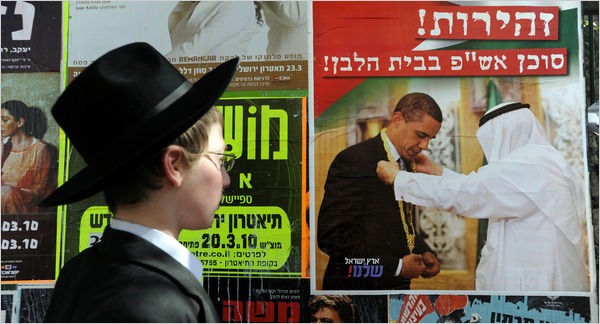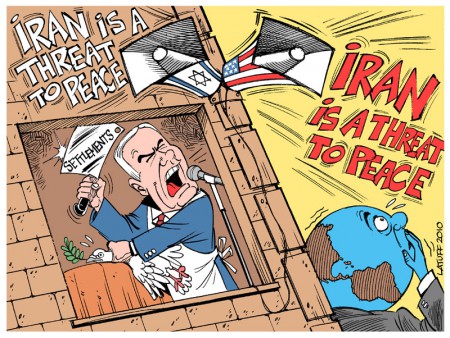EDITOR: The Show Does Go On, after it was supposedly off…
So here we go again! After all US big knobs were doing all they could to bury the hatchet, and to praise Netanyahu for his willingness, and realy going overboard about US support for Israel, then Bibi bounces again and hits them with the ugly reality of Israeli deep unwillingness to negotiate peace on real terms. There will be no real negotiations, and no just peace as well as Israel has its way.
The rest of us must redouble our efforts against this bully, on the BDS campaign, raising international awareness of the the need to force Israel into proper just peace negotiations, as Zionism will never reform itself. Never.
Netanyahu Takes Hard Line on Jerusalem Housing: NY Times
By MARK LANDLER

WASHINGTON — Prime Minister Benjamin Netanyahu of Israel, under extraordinary pressure from the Obama administration to curb the construction of Jewish housing in Jerusalem, served notice on Monday that his government would not yield easily to American demands.
Israeli Prime Minister Benjamin Netanyahu addressed the gala banquet of the American Israel Public Affairs Committee (AIPAC) annual policy conference on Monday night.
In a speech to a pro-Israel lobbying group, Mr. Netanyahu reiterated that Israel had no plans to freeze housing in Jerusalem, the trigger for a recent dispute between Israel and the United States. He rejected the administration’s contention that Israel’s policies were impeding the peace process.
“The Jewish people were building Jerusalem 3,000 years, and the Jewish people are building Jerusalem today,” Mr. Netanyahu said to the group, the American Israel Public Affairs Committee. “Jerusalem is not a settlement; It’s our capital.”
Earlier Monday, Mr. Netanyahu met for 75 minutes with Secretary of State Hillary Rodham Clinton, in the first of a series of meetings expected to reveal whether the United States sticks to its hard line with Israel on settlements. He later met with Vice President Joseph R. Biden Jr., and he was scheduled to meet President Obama on Tuesday.
The flurry of meetings is designed to calm the waters after nearly two weeks of tension between the United States and Israel, amid a diplomatic row that both countries have portrayed as the gravest in years. But judging by Mr. Netanyahu’s comments, it is far from clear that he plans to satisfy the demands that Mrs. Clinton made of him in a phone call 10 days ago.
The State Department spokesman, Philip J. Crowley, said that Mrs. Clinton and Mr. Netanyahu had “had a further discussion of the specific actions that might be taken to improve the atmosphere.” He did not give details.
The prime minister’s remarks were a pointed bookend to an earlier address to the same group by Mrs. Clinton. She warned that the Obama administration would push back “unequivocally” when it disagreed with the Israeli government’s policies. But she reaffirmed that America’s support for Israel was “rock solid, unwavering, enduring and forever.”
Mrs. Clinton sought to build solidarity with Israel on one area where they clearly have common ground, the potential nuclear threat from Iran. In the most enthusiastically received part of her speech, she pledged to stop Iran from getting a nuclear weapon.
She said the Obama administration was seeking sanctions with “bite.” That characterization is a modest, but noticeable, retreat from the administration’s language from last year, when Mrs. Clinton said the United States was seeking “crippling sanctions.”
“There must be no gap between the United States and Israel on security,” she said to loud applause.
The crowd of 7,000 quieted down quickly when Mrs. Clinton bluntly warned that the status quo in the Middle East was unsustainable, and that Israel’s continued construction of Jewish housing was undermining the prospect for peace talks between Israelis and Palestinians.
Mrs. Clinton defended her rebuke of Mr. Netanyahu’s government over its announcement of 1,600 housing units in East Jerusalem during Mr. Biden’s visit. The move, she said, jeopardized indirect talks that the administration is trying to broker between Israelis and Palestinians.
“Our credibility in this process depends in part on our willingness to praise both sides when they are courageous, and when we don’t agree, to say so, and say so unequivocally,” she said.
In her call to Mr. Netanyahu, she demanded that Israel reverse the housing plan in the neighborhood of Ramat Shlomo; that the Israelis avoid further provocations in Jerusalem during planned peace talks; and that Mr. Netanyahu commit to substantive rather than procedural negotiations with the Palestinians, as Israel has said it would prefer.
Daniel C. Kurtzer, a former American ambassador to Israel, said that Mrs. Clinton’s speech had succeeded in reaffirming the strategic importance of the United States-Israel relationship while not backing down on settlements. But he said the administration had not laid out a broader proposal for what comes next.
“There’s a choice being made here that the U.S. doesn’t want to put forward its own views,” Mr. Kurtzer said.
Still, after a week in which many pro-Israel observers worried that their country and the United States were on the brink of a breakdown in relations, Mrs. Clinton’s speech to the American Israel Public Affairs Committee seemed reassuring for Israel. Despite predictions that she would be booed, the audience greeted her politely.
“I thought she was excellent,” said Hal Rosnick of Easton, Conn. “She wants the parties to get back to indirect negotiations.” But Diane Hornstein of Chicago, said, “I would like her to recognize that Jerusalem is not a settlement. There’s no evenhandedness in the demands made of Israel.”
On one topic — Iran — Mr. Netanyahu and Mrs. Clinton seemed largely in agreement. “Iran’s brazen bid to develop nuclear weapons is first and foremost a threat to my country, Israel,” the prime minister said, “but it is also a grave threat to the region and to the world.” The Israeli people, he said, “always reserve the right of self-defense.”
In making her own tough statements on Iran, Mrs. Clinton acknowledged that the process of building support for sanctions in the United Nations was taking longer than expected. “Our aim is not incremental sanctions, but sanctions that will bite,” she said.
Mrs. Clinton praised Mr. Netanyahu for his 10-month moratorium on the building of settlements on the West Bank, and noted that the future status of Jerusalem would be hashed out at the bargaining table.
Mrs. Clinton condemned those who incite violence against Israelis, including Palestinians who whipped up anger after Israel rededicated a synagogue in the Jewish quarter of Jerusalem.
But Mrs. Clinton also made clear that the dispute over Mr. Biden’s visit might not be an isolated incident. The administration, she said, will continue to speak out against decisions it views as jeopardizing the peace process.
“As Israel’s friend,” she said, “it is our responsibility to give credit when it is due and to tell the truth when it is needed.”
Netanyahu reaffirms ‘right to build’ in Jerusalem: BBC
Prime Minister Benjamin Netanyahu has asserted Israel’s “right to build” in Jerusalem, following a row with the US over plans for new homes in the city.
“Jerusalem is not a settlement, it’s our capital,” he said in Washington.
But Mr Netanyahu did not mention the decision to expand the East Jerusalem settlement of Ramat Shlomo in a speech to the pro-Israel lobby group, Aipac.

Earlier, US Secretary of State Hillary Clinton told the meeting Israel had to make “difficult” choices for peace.
She said the continued expansion of Jewish settlements in Palestinian occupied territory undermined the US role in the peace process.
The Palestinian Authority is furious at Israel’s insistence on building on occupied territory. It sees it as a serious stumbling block to the resumption of talks, which have been stalled for more than a year.
Some 500,000 Jews live in more than 100 settlements built since Israel’s 1967 occupation of the West Bank and East Jerusalem. They are considered illegal under international law, which Israel disputes.
Call to Abbas
In his speech to a convention of the influential American Israel Public Affairs Committee (Aipac) on Monday evening, Mr Netanyahu said that “the Jewish people were building Jerusalem 3,000 years ago and the Jewish people are building it today”.
New construction in east Jerusalem or the West Bank undermines mutual trust and endangers the proximity talks that are the first step toward the full negotiations that both sides want and need
Settlements in occupied East Jerusalem were an “inextricable” part of the city, he said, and would remain part of Israel under any peace agreement.
“Therefore, building in them in no way precludes the possibility of a two-state solution.”
He said Israel wanted Palestinians to be “our neighbours, living freely” and called on Palestinian Authority President Mahmoud Abbas to “come and negotiate peace”.
Mr Netanyahu added that while the US could help resolve both sides’ problems, peace could not be imposed from the outside.
Speaking just hours earlier to the same audience, Mrs Clinton urged Mr Netanyahu to extend Israel’s suspension of new building in the West Bank to include East Jerusalem.
ANALYSIS
Jeremy Bowen, BBC Middle East editor, Washington
Prime Minister Netanyahu made a tough speech, reasserting what he believes to be Israel’s right to build wherever it wants in Jerusalem.
Israel’s latest building plans in occupied East Jerusalem have been condemned by the Obama administration and are at the heart of the current crisis in relations between the two countries.
Both sides have been trying to take the heat of the dispute, re-emphasising their friendship.
Perhaps Mr Netanyahu has given some kind of private assurance to the Americans that he won’t surprise them with any more building projects.
But his speech shows that on the fundamentals of the issue the US and Israel are far apart.
She said the continued expansion of Jewish settlements undermined “mutual trust and endangers the proximity talks that are the first step toward the full negotiations that both sides want and need”.
“It exposes daylight between Israel and the United States that others in the region hope to exploit,” she added.
Last week, the Israeli prime minister proposed a series of “trust-building measures” that he said represented “a real effort” to aid US peace efforts.
Although details have not yet been made public, Israeli officials said these included an agreement to discuss all outstanding issues in the indirect “proximity talks” being mediated by US special envoy George Mitchell.
In Monday’s speech, Mr Netanyahu also warned that “Iran’s brazen bid to develop nuclear weapons… is the threat to the entire world”.
He urged the world community to act “swiftly” to “swart this danger”.
Iran insists its nuclear programme is solely for civilian purposes.
Mr Netanyahu is scheduled to meet President Obama later on Tuesday.
Meanwhile, at least three people were injured in an Israeli air strike overnight in the east of Gaza City, Palestinian officials said.
Israel said the air strike in Gaza was retaliation for rocket attacks
The Israeli military said its aircraft had targeted a weapons storage facility in retaliation for Palestinian rocket attacks since Thursday, one killing a Thai farm worker.
In a separate incident, an Israeli soldier was shot dead by his comrades on the Gaza border.
An army spokesman said one group of soldiers had opened fire on another after mistaking them for Palestinians who had crossed the border into Israel.
Three Palestinian men who were later captured and taken in for questioning were found to be unarmed.